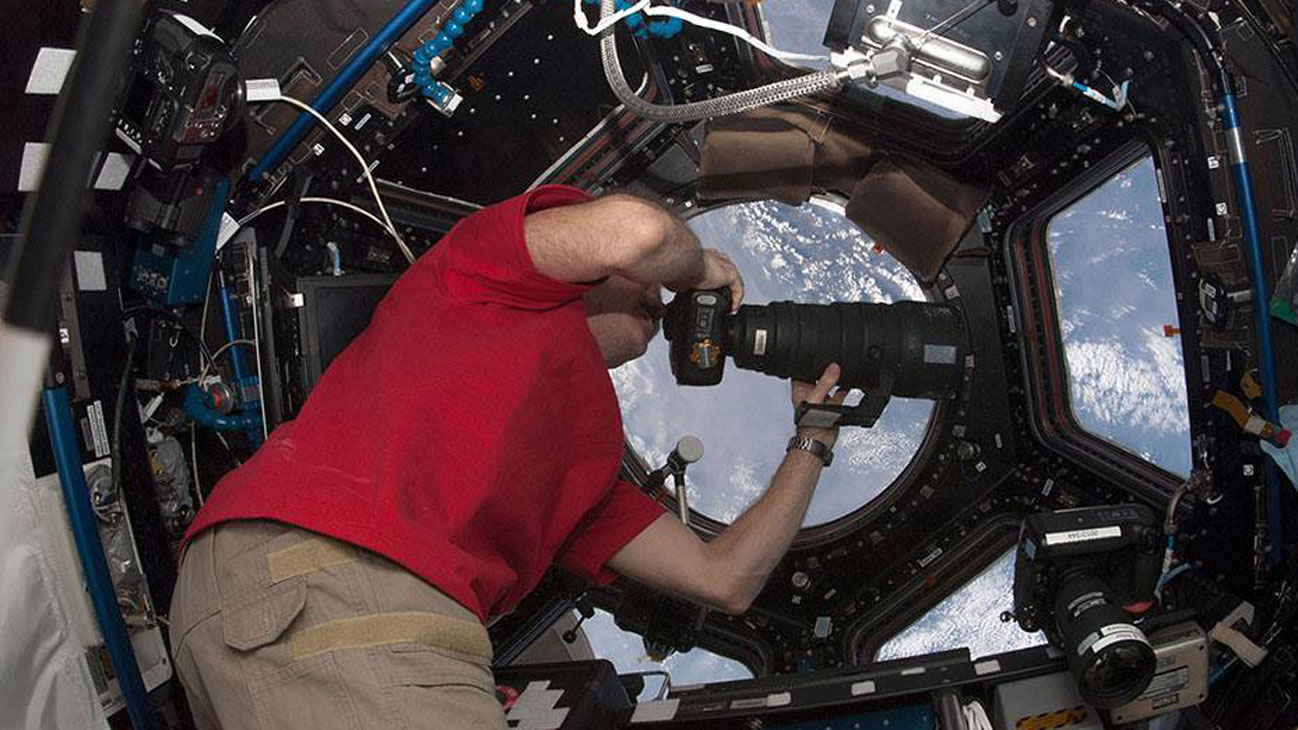Chris Hadfield is arguably the world’s favorite astronaut. There may be stiff competition for the title in the age of constant social media updates from space — especially now that Hadfield, former commander of the International Space Station, is officially retired — but he stands apart as one of the first space explorers to take the Internet by storm. Whether performing David Bowie songs in zero gravity or demonstrating how crying works when you’re in space, the Canadian pilot was eager to share his experiences with folks back home.
“A lot of people go somewhere with an agenda,” Hadfield told The Washington Post. “But that’s not how I went to space. I wanted to show people what it’s actually like up there and let them draw their own conclusions.”
That’s the kind of explorer Hadfield wants to be. When he spoke with The Post on Monday, he was just a few hours away from his latest adventure — an expedition to the Arctic. Hadfield and “a little cadre of chroniclers” — YouTube stars, photographers, writers and musicians — will board the Russian icebreaker “Kapitan Khlebnikov” to see what they can see.
The trip, hosted by Quark Expeditions and largely funded by the tickets of tourists aboard the ship, is inspired by a performance series called Chris Hadfield’s Generator. In Generator shows, he gathers groups of intriguing individuals from all sorts of disciplines and tries to get them the sort of public attention usually reserved for the performing arts. Previous events have included science educators and bionic exoskeleton designers onstage with the likes of poets and indie bands.
“An evening’s entertainment doesn’t have to be transient,” he said. “We wanted to figure out how to take these really interesting people and make their ideas respected.”
His little cadre of chroniclers was assembled in much the same way. They don’t really know one another, and they don’t have any particular reason to journey to the Arctic. They’re there to explore and marvel at what they find, and to share that experience with the world somehow. Hadfield said he hopes the diverse group will come up with unique ways of sharing the experience with those not physically present. And just as Hadfield went into space without an agenda, his team of documentarians enter the Arctic without any particular goals.
“If you kind of go in there proselytizing at the very beginning, I think you miss out on being a good first observer of the place,” he said.
Hadfield may be famous for commanding the ISS, but he’s a documentarian at heart. He wants to tell you what the weather is like where he’s sitting on the phone, and how beautiful the sun looks coming up over the water. He asks how the weather is where you are — and he genuinely wants to know. When the live streaming app Periscope invited Hadfield to be among its first users, he earnestly dove into hours of chats about music and space with Internet strangers. It’s clear that Hadfield means it when he says he values the sharing of thoughts and experiences.
When asked what Arctic features he was most excited to see, Hadfield, who will turn 57 on the icebreaker, said that time itself was the biggest attraction. His first two space missions, he said, had been just a few days long. It took the months he spent aboard the ISS for him to really appreciate the experience.
“Going around the world every 92 minutes was the same, the fundamental nature of it was identical, but the big difference was the time I had to think about it, time to look twice or four or 10 times, time to reflect with the people around you who are also experiencing unexpected delights, and who are also keen observers,” he recalled. He likened the experience to taking a three-hour trip to the Louvre, then returning to spend three days staring at the Mona Lisa.
Once Hadfield returns home Sept. 8, he’ll leave again almost immediately to go on tour for his new book, “The Darkest Dark,” which goes on sale Sept. 13. After publishing two books for adults — “An Astronaut’s Guide to Life on Earth” and “You Are Here,” a book of photos — Hadfield, who recently became a grandfather, has written his first children’s book.
“To me, all of this is part of exactly the same effort, the same thing I’ve been trying to accomplish all of my life,” Hadfield said. He wants to share the things he’s been lucky enough to see, especially now that he’s seen the way his granddaughter interacts with the world.

“If you look at a young person, they start deciding what opportunities exist in life, what’s normal behavior, what people like them do and what people like them don’t do, almost instantly,” he said. “When I carry my granddaughter around, she’s just watching everything like a little owl, and I can see her little brain saying, oh, this is what tables do, this is what pots do, this is what grandmas and grandpas and dogs do. She’s just internalizing what is normal and what her role in the world is going to be without anyone saying anything.”
That’s why his latest book is aimed at very young children, focusing on the fear of the dark. Hadfield wants young children to see fear not as a wall they can never cross over, nor as a blanket they need to hide under. He wants them to see fears as things that they can overcome and that might be hiding untold, wondrous opportunities. Children who overcome their fear of the dark might one day get to sit among the stars.
“I’m trying to let a young person see an opportunity for them far beyond what they see when their grandpa is carrying them around the kitchen,” he said.

